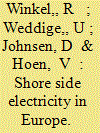|
|
|
Sort Order |
|
|
|
Items / Page
|
|
|
|
|
|
|
| Srl | Item |
| 1 |
ID:
133418


|
|
|
|
|
| Publication |
2014.
|
| Summary/Abstract |
At the end of the Second World War, British intelligence struggled to enforce strict limits imposed on Jewish immigration to Palestine. Holocaust survivors and Jews wishing to escape communism in Eastern Europe flooded the western Zones of occupation in Germany and Austria, while the Zionist movement worked to bring them to Palestine. Illegal immigration to Palestine was the key policy dispute between Britain and the Zionist movement, and a focus for British intelligence. Britain sought both overt and covert means to prevent the boarding of ships at European ports which were destined for Palestine, and even to prevent the entry of Jewish refugees into the American zones. This article highlights Britain's secret intelligence-gathering efforts as well as its covert action aimed to prevent this movement. It highlights a peculiar episode in the 'special relationship' between Britain and the United States, during which cooperation and partnership was lacking. British intelligence promoted a rumour that Soviet agents were using Jewish escape lines to penetrate Western Europe and the Middle East in order to persuade American authorities to prevent the movement of Jewish refugees. Instead, this article argues, American intelligence secretly cooperated with the Zionist organizers of the escape routes so to expose Soviet agents. Britain's attempt at deception backfired, and provided effective cover for the movement of hundreds of thousands of Jews during a critical period. Meanwhile its intelligence had dramatically improved, but policymakers failed to reassess Britain's ability to sustain immigration restrictions and the indefinite detention of tens of thousands of illegal migrants.
|
|
|
|
|
|
|
|
|
|
|
|
|
|
|
|
| 2 |
ID:
132617


|
|
|
|
|
| Publication |
2014.
|
| Summary/Abstract |
Ports are characterised by the geographical concentration of high-energy demand and supply activities, because of their proximity to power generation facilities and metropolitan regions, and their functions as central hubs in the transport of raw materials. In the last decades the need to better understand and monitor energy-related activities taking place near or within the port has become more apparent as a consequence of the growing relevance of energy trades, public environmental awareness and a bigger industry focus on energy efficiency. The uptake in the port sector of innovative technologies, such as onshore power supply, or alternative fuels, such as LNG, and the increasing development of renewable energy installations in port areas, also calls for more attention to energy matters within port management.
So far, however, few port authorities have actively pursued energy management strategies. The necessity for port authorities to actively manage their energy flows stems from their efforts to plan, coordinate and facilitate the development of economic activities within the port, and as a consequence of the heavier weight that sustainability is given within the port management strategies.
Through the analysis of the experiences of two European ports, Hamburg and Genoa, that have already attempted to coordinate and rationalise their energy needs, this paper will argue that for the ports of the future active energy management can offer substantial efficiency gains, can contribute to the development of new alternative revenue sources and in the end, improve the competitive position of the port.
|
|
|
|
|
|
|
|
|
|
|
|
|
|
|
|
| 3 |
ID:
150344


|
|
|
|
|
| Summary/Abstract |
In the context of reducing emissions from the transport sector, the EU Commission envisions a strong modal shift to energy efficient modes including maritime shipping and inland shipping, as an alternative for road transport. In view of the expected growth of the sector, the emissions from waterborne transport are a key concern. When at berth, ships typically use their auxiliary engines to generate electrical power for communications, lighting, ventilation and other on-board equipment. The extended use of vessels’ auxiliary engines augments greenhouse gas (GHG) emissions and air pollution in the adjacent ports, which are typically located in or near densely populated areas, thus leading to dangerous health and environmental effects. Shore Side Electricity (SSE) is an option for reducing the unwanted environmental impacts of ships at berth, i.e. GHG emissions, other air pollutants (NOx, SOx, PM) and noise of ships using their auxiliary engines. This paper quantifies the economic and environmental potential for SSE in Europe, through detailed estimation of in-port ships’ emissions and relevant energy demand, providing an insight of the expected barriers for implementation and formulating recommendations on policy actions that could accelerate the implementation of SSE in European harbors.
|
|
|
|
|
|
|
|
|
|
|
|
|
|
|
|
|
|
|
|
|